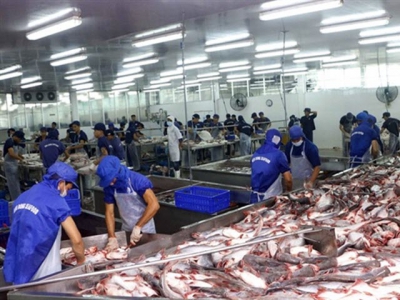Tra fish companies see stock prices plummet

HÀ NỘI — Việt Nam's tra fish (pangasius) industry has seen a plummet in stock prices due to falling tra fish prices and volatile export markets.
Tra fish is processed for export at Biển Đông Seafood Co Ltd in Trà Nóc II Industrial Zone in the southern city of Cần Thơ. — VNA/VNS Photo Thanh Liêm
In July, tra fish export value decreased by 12.7 per cent month-on-month and this was the 5th consecutive month seeing prices falling. In the first seven months of this year, total export value of tra fish dropped by 5.5 per cent to US$1.13 billion.
In 2018, the US made up more than 24 per cent of Việt Nam's tra fish export market, becoming the country’s largest tra fish consumer with import value soaring 54.5 per cent year-on-year. China was second with a growth rate in imports of 29 per cent, accounting for 23.7 per cent of Việt Nam's tra fish market.
This year, the Việt Nam Association of Seafood Exporters and Producers (VASEP) forecast that the US imposition of tariffs on Chinese tilapia would create opportunities for Vietnamese tra fish.
However, orders from the US plummeted. In July alone, tra fish exports to the US fell to $167.6 million, sending US to second position after China, with $168 million.
The Đồng Tháp Province-based tra fish processor Vĩnh Hoàn Company (VHC) saw both revenue and profit in the second quarter slumping, down 9.6 per cent and 7 per cent, respectively.
In July, VHC recorded a 23 per cent decrease in tra fish export value over the same period last year, to $28 million. In seven months, VHC's exports dropped by 4.6 per cent to $186 million. The US, VHC’s main export market, saw tra fish value purchased from the company drop by 34 per cent in seven months.
Falling exports caused VHC shares to fall. After reaching a peak of VNĐ107,700 ($4.6) per share at the end of 2018, VHC dropped sharply to hover around VNĐ80,000 per share in late August this year
Cửu Long Fish Joint Stock Company (ACL) recorded revenue falling 4 per cent in the second quarter, reaching VNĐ373 billion. After-tax profit rose by 18 per cent to VNĐ59 billion. Six-month revenue and profit still gained 13 per cent and 50 per cent to touch VNĐ817 billion and VNĐ113 billion, respectively.
ACL touched its all-time peak of VNĐ46,000 per share in mid-April, but then declined by 24 per cent to VNĐ35,000 per share on Monday.
Another tra fish exporter – I.D.I International Development & Investment Corporation – also witnessed a sharp decline in profits. Although 6-month revenue increased by 31 per cent to VNĐ3.7 trillion, after-tax profit slumped by 29 per cent to VNĐ226 billion.
On the stock market, IDI has lost 40 per cent in the past year and is currently trading at VNĐ6,180 per share.
Hùng Vương Corporation (HVG), one of the biggest seafood processors in Việt Nam, and its affiliate Agifish (AGF) also faced difficulties when the US Department of Commerce announced its final decision of the DOC’s 14th Period of Review on anti-dumping tariffs on Việt Nam’s tra fish batches imported into the country.
Under the decision, the official tariff on HVG’s products is $3.87 per kg, compared to the preliminary level of zero US dollar per kg.
In the third quarter of fiscal year 2019 (April 1-June 30), HVG suffered a big loss of VNĐ129 billion, while revenue fell 64 per cent to VNĐ527 billion.
In the first nine months of the fiscal year 2019 (October 1, 2018 to June 30, 2019), HVG lost nearly VNĐ257 billion.
Its affiliate company, Agifish (AGF), also saw 9-month revenue drop 41 per cent to VNĐ639 billion, thereby suffering a loss of VNĐ118 billion.
In mid-April 2019, HVG hit its one-year peak of VNĐ8,500 per share, but then fell.
Also in mid-April, AGF hit a one-year peak of VNĐ6,900 per share.
Related news
 Greece increases imports of Vietnamese tuna
Greece increases imports of Vietnamese tuna Vietnam’s tuna exports to Greece increased 104 percent year-on-year to reach nearly 1.8 million USD by the end of July 2019
 Difficult to export Pangasius to America
Difficult to export Pangasius to America Pangasius exports to the US in August continued to decline sharply, making this key product into the US market more difficult.
 Vietnamese shrimp exports recover in July
Vietnamese shrimp exports recover in July After continuous declines in the first months of the year, shrimp exports began to recover in July with an increase of 13.4 per cent and reached $334 million.